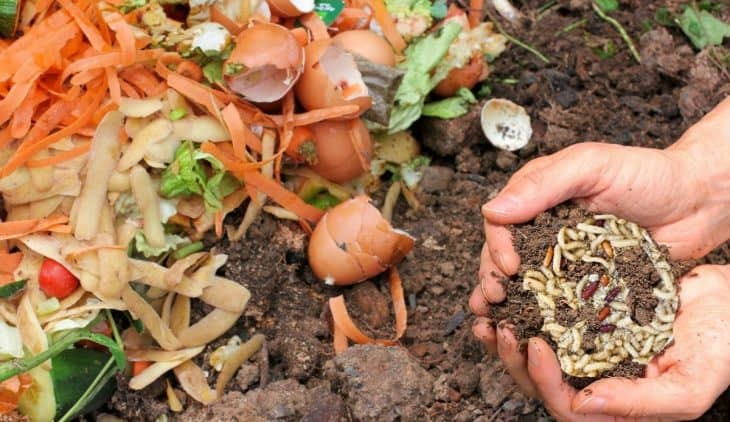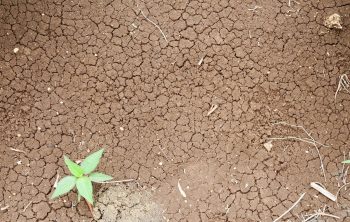So let’s talk about maggot in your compost. You might be the one that freaks out when you see maggot in your compost. But they are not so bad and they can’t hurt you.
Actually, they are pretty useful in breaking down waste in your compost pile. They will even make decomposition faster and they will help in recycling nutrients back into the
What is a Compost Maggot?
Compost maggots are actually the black soldier fly larvae. Black soldier fly (BSF) are simply normal housefly. When these flies settle on your compost, they lay their eggs and result in larvae (maggot). The maggot may be white, grayish, or brownish and segmented depending on what your compost consists of.

The segmented maggots are as long as one inch to one and a half inch. The maggots are born from black soldier fly eggs right into the food waste especially in conditions that are damp. They feed on the nitrogen-dominant decaying matter such as scraps from your kitchen and manures.
Black soldier flies do well in a warm environment with a temperature of about 80 to 90 degrees. However, when the temperature reaches above 100 degrees, they will lose their strength and die off.
The Usefulness of Maggot in Your Compost
Those tiny black soldier flies which are maggots are like devouring beasts. They can consume a huge amount of food scrapes faster than you can imagine. Thus, they will make the decomposition of your compost fast. And if you are concerned they might show up in your home, not too worry. That won’t happen only if you place your compost pile is close to your window.
In the southern part of the United States, these maggots are been used to decrease hog manure. This is because they are capable of consuming as much as 30 tons of hog manure in just two days.
So, you can even place your compost outdoor far away from your house, and not worry about getting rid of them for a long time. The mission is to reduce waste!
Matter of fact, some farmers go ahead and cultivate these black soldier larvae and sell them to pet stores. They are very high in protein and are excellent foods for birds, lizards, and even fish.
Read about Best Compost Products Suppliers on the Market Today
Eliminating Maggot in Your Compost Bin
As we have mentioned earlier, maggot in your compost is beneficial. However, if you can’t stand them and you want to get rid of them. You can do the following:
- Add Dry Material into your Compost: because these maggots thrive in damp environments, adding dry materials such as browns will prevent them from emerging. Add dry materials such as dry grass, dry leaves, shredded papers, and cardboards and cover them at least two to four inches. This will create a dryer environment and also cover the nitrogen food source. This is because it is this exposed nitrogen food materials the female soldier loves to lay their eggs on.
- Bury Food Scraps: if it is a compost bin or a worm bin you have, bury the food scrap right at the bottom (at least 6 inches) of the pile. Also, ensure they are well covered.
lEnvirocycle Composting Tumbler Bin
- Reduce Flies by Covering Holes with Window Screen: if you are able to prevent flies from entering your compost, they won’t lay eggs and you will have no maggots. Therefore, cover every hole with a window screen and hold it down with a waterproof filter or seal.
- Apply Lime to your Compost: you can add lime to your compost to deter these black fly larvae. However, adding lime to your compost can interfere with the pH. It can make the pH too high when it’s done composting. Even though lime also helps in the breakdown of compost, it is usually not needed. But you can add lime if your compost is acidic so as to make your compost slightly alkaline. Also, the amount of lime added should not exceed one cup per 25 material feet.
In the end, these maggots in your compost will die and their bodies will decompose. They will in the due process leave behind thick and rich components for your
FAQ’s
Do maggots ruin compost?
Maggots are not bad for compost and you can use them if you would like. They eat dead plant matter and help break down the material. I have had my compost pile for a few months and the compost is still active. However, if you notice any maggots around your compost pile, then there is too much moisture or your pile is too big. I just found out that maggots can also be used to control pests in soil. They are most commonly used as a biological pest control agent (BPCA) for termite management. I did not know this until recently.
Are maggots good for compost?
Maggots are tiny fly larvae that feed on organic matter such as decaying animal flesh, plant material and manure. They are commonly used in agriculture as a natural means of pest control.
They can be used as a natural insecticide and they will eat most types of pests.
Benefits of using maggots in the garden
They help to break down organic matter: Maggots eat all kinds of waste, including plant material and manure. They are especially useful when breaking down manure, which may not be able to decompose on its own. If you use compost that has been left too long, you can add maggots to help break it down. This is especially useful if you have a lot of manure to deal with, as the larvae can eat large amounts of manure in just a few weeks. They are also useful for gardeners who have a lot of manure or waste to dispose of. You can use maggots to help break down manure and other organic matter.
They eat all kinds of waste: Maggots can eat anything from food scraps to leaves to fruit husks. This makes them useful for gardeners who have a wide variety of waste that they need to get rid of.
In fact, they’re so versatile that you may find yourself using them in more than one way. For example, you could use them to get rid of waste in your garden while also making fertilizer.
They’re also useful when it comes to breaking down manure and other organic waste: When they’re ready to pupate, maggots will leave the waste behind. The pupae will then hatch into adult flies. This is how they turn your organic waste into compost. It is very important to know when the larvae are ready to pupate. This is where you will have to pay close attention to their development.
You can help maggots to break down manure: If you have a lot of manure that you want to get rid of, you can use maggots to help break it down. You can either add them directly to the manure or place them in a bin with the manure.
You can also use them to help break down other organic matter: If you’re dealing with waste that is hard to break down on its own, you can use maggots to help. You can either place the waste directly into a bin with the maggots or you can place them in a container with the waste and then bury it. This helps to break down the waste and to make fertilizer out of it.
Maggots can be used in many ways: Maggots are versatile. They can be used in a variety of ways. One way that you can use maggots is to help you to get rid of waste. You can either place the waste directly into a bin with the maggots or you can place them in a container with the waste and then bury it.
You can also use them to help break down manure and other organic matter: When they’re ready to pupate, maggots will leave the waste behind. The pupae will then hatch into adult flies.
How do I get rid of maggots in my compost bin?
I have a big pile of compost that's ready to be turned. It has been sitting for a month or so. I noticed maggots in the pile and now I'm seeing them in the garden too. The compost is not sitting on top of soil but it is sitting on the ground with a little dirt underneath it. I don't know how to get rid of them. What can I do? A:
You should take a shovel and remove all the compost. Remove all the dirt and replace it with fresh dirt. This will help to kill the larvae.
If the larvae are still active, you can mix the compost with other dirt and replace the dirt with fresh dirt. This will help to kill the larvae.
You can use a light bulb to kill the larvae.
You can wait and see if they die on their own.
This should be done right away so that they do not contaminate the soil underneath. Maggots are not harmful to your plants but they are bad for your compost. They eat the compost and they cause the compost to become smelly.
Conclusion
Maggot might be disgusting and gross to behold. But you should consider the good they do to your compost. Think of it, you put a big pound of waste in your bin. A couple of hours later, the waste has reduced drastically.
After the black soldier larvae are done with your compost pile, they will crawl out and vanish. During this process, they can become food to birds and other little animals.

Eunice is an enthusiastic gardener with a passion for growing beautiful flowers. She loves nothing more than spending time in her garden, tending to her plants and enjoying the outdoors. Eunice has been gardening for over 15 years and has developed a unique style of landscaping that is both practical and aesthetically pleasing. She is especially fond of growing roses and enjoys experimenting with different varieties and colors. Eunice takes great pride in her garden and often shares the fruits of her labor with friends and family. In her spare time, she enjoys reading gardening magazines and attending local horticulture events. Eunice is passionate about her hobby and is always eager to share her knowledge and experience with others.





